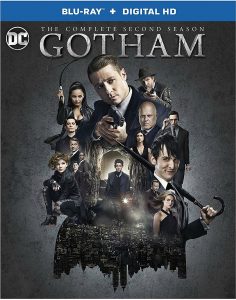At first blush, prequels should be a boring form of storytelling, because we already know the end point. Of course, there are many examples that prove out-of-sequence storytelling can work – the “Star Wars” prequels and “Smallville” have plenty of fans, for example. But three current series – A&E’s “Bates Motel,” Fox’s “Gotham” and AMC’s “Fear the Walking Dead” — have turned the prequel into an art form, garnering extra drama from the fact that the audience knows where the story is going.
The unspoken undercurrent of “Bates Motel” is that when we get to the narrative of the “Psycho” movie, Norman Bates and his deceased and taxidermied mother are the only “Bates Motel” characters remaining in the narrative. Dylan, Emma and Sheriff Romero – none of whom are in any of the “Psycho” movies — are far too significant to simply be absent during the time when Norma dies and Norman preserves her corpse and begins managing the motel solo.
That gives extra spice to scenes such as the one in Monday’s episode when Emma and Norman agree that nothing will ever come between their friendship. I suspect that the fact that Norman killed Emma’s mom might come between their friendship, and it will put further strain on Dylan’s awkward position as someone who cares about both his brother and his girlfriend.
Romero, in addition to being Norma’s husband and Norman’s stepfather (much to Norman’s anger), also possesses a lot of casefiles and institutional knowledge about Norman’s mental problems from his job as sheriff.
For the “Psycho” story to happen more or less as it does in the 1960 movie (and the 1998 shot-for-shot remake), these three major characters have to be out of the picture. It could mean they move away, as Norman’s girlfriend Cody moved to Indiana a couple years ago and Norma’s brother Caleb moved to Central America. Dylan and Emma are currently planning to move from White Pine Bay, Ore., to Seattle.
Or it could mean Norman kills them all. Judging by the escalating narrative, I’m betting on the latter.

“Gotham” operates with less subtlety, but I’ve still been impressed with the writers’ balancing act. Bruce Wayne is morphing into the boy-who-will-be-Batman. He picks up some street smarts from Selina, some fighting skills and tips from Alfred, and most recently he seems intrigued by Azrael’s ability to slink away from the authorities by climbing buildings in the smoke-laced Gotham night.
At the same time, we get the origin stories of all the classic villains without Bruce meeting them. To be consistent with Batman lore, he can’t meet them until he becomes Batman. However, Detective Gordon can, so we’re allowed some juicy Penguin, Riddler and Mr. Freeze tales. Meanwhile, Bruce’s on-again-off-again friendship with Selina is being established, and (Poison) Ivy is also a contemporary of theirs.
As viewers, we know the beats of the Batman and Gotham City arc, but we’ve never before gotten to immerse ourselves in it to the degree “Gotham” allows.

“Fear the Walking Dead” is the strangest prequel of this trio, because whereas “Bates Motel” and “Gotham” are structured on the idea of an end point, this show is not. It may not link up with “The Walking Dead” at all; it might merely be a companion piece showing post-apocalyptic character studies on the West Coast to go along with those from the Southeast.
Aside from the fact that they’re set in the same narrative universe, there have been no links to “The Walking Dead” so far. If “Fear” doesn’t link up, though, that would be a missed opportunity. Popular theories so far are that Madison Clark is the sister of Rick Grimes (they both have Southern accents) or the sister of Andrea (the actresses have similar styles).
Until “Fear’s” group heads East or the parent show’s group heads West, we’re getting ahead of ourselves by making predictions. But I’ll throw out one possibility. “The Walking Dead” currently shows a murderous and popular dictator named Negan, raising the question of how someone like that could gain followers. Meanwhile, we’re seeing “Fear’s” good-hearted but angry young man Chris get comfortable killing walkers (or “infected,” as it were) and severely injured people who can’t be saved. No doubt, he’s working his way up to killing humans. Perhaps he’s on a trajectory toward being a Savior in five years.
“Fear the Walking Dead” has more freedom than the other two shows because “The Walking Dead” is still ongoing; it’s not set in stone like “Psycho” and the Batman tale are.
On the other hand, “Bates Motel” and “Gotham” – which are arguably “premakes” rather than “prequels” — could build some freedom into their narratives if they choose to. “Bates Motel,” after all, is not linking directly to “Psycho,” as the TV show is set during the present day and the movie was set in 1960. “Gotham,” likewise, is not linking directly to 1989’s “Batman” or 2005’s “Batman Begins” or this year’s “Batman v. Superman: Dawn of Justice.” The general beats will be in place, but there is room for tweaks.
In the case of all three shows, the fact that they are prequels is not in itself enough to make them compelling, but the “How will it link up?” question definitely adds an extra layer of intrigue. (Further adding grist to the argument that this is a golden age for TV prequels is that Disney XD’s “Star Wars: Rebels” recently wrapped up a Season 2 that was loads better than its first season. “Rebels” has featured a bit of backstory for film characters Tarkin, Darth Vader and Princess Leia, although the series’ main characters are not in the films. Because “Star Wars” has always told stories out of sequence, the prequel aspect of “Rebels” seems less remarkable than it does for these other franchises, even though it certainly is a prequel to “Episode IV.”)
What are your predictions for how “Bates Motel,” “Gotham” and “Fear the Walking Dead” will connect with established lore?


